跨文化翻译2
- 格式:ppt
- 大小:413.00 KB
- 文档页数:51

Unit 1Settling down at college around the world适应校园生活——来自世界各地的访谈Tanya Zarutskaya Moscow, Russia塔尼娅•扎茹茨卡娅莫斯科,俄罗斯This time last year I was nervous about my new life.去年的这个时候,我对新生活感到很紧张。
I didn't have any friends, and it was my first time away from home. 我没有朋友,也是第一次离开家。
At first I worked all the time, going to lectures and studying late into the night.一开始,我一天到晚都在忙功课:上课,并且学习到深夜。
But then I realized I was missing out on so many other things at university. 可后来我意识到我错过了大学里许多其他活动。
One day a girl in my hall of residence invited everyone in the dorm to a dinner party.一天,跟我住同一幢宿舍楼的一个女孩儿邀请全楼的人去参加一个晚宴。
I've no idea where she managed to buy the food, or how she had enough money. 我不知道她在哪儿买的那些吃的,也不清楚她怎么会有足够的钱。
And she dressed like a model.而且她穿得像个模特儿。
I don't know why she was bothering with university!我真不知道她干嘛还要费那劲儿上大学!I've got to know lots of interesting people and I now enjoy myself as well as study hard.现在我结识了许多有趣的人,既努力学习,也快乐地生活。
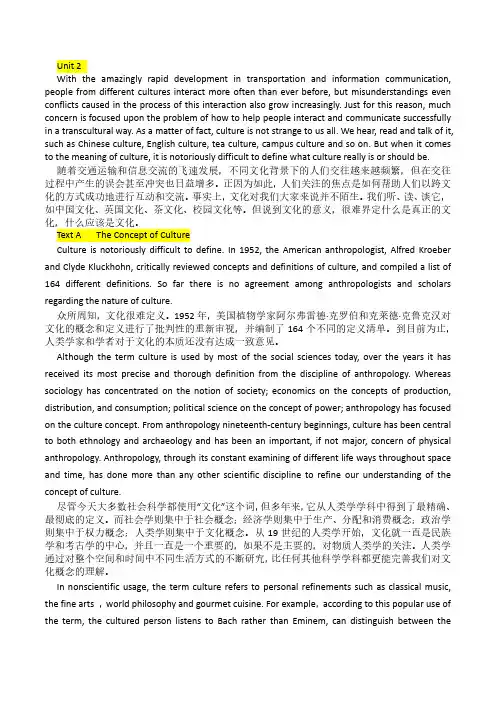
Unit 2With the amazingly rapid development in transportation and information communication, people from different cultures interact more often than ever before, but misunderstandings even conflicts caused in the process of this interaction also grow increasingly. Just for this reason, much concern is focused upon the problem of how to help people interact and communicate successfully in a transcultural way. As a matter of fact, culture is not strange to us all. We hear, read and talk of it, such as Chinese culture, English culture, tea culture, campus culture and so on. But when it comes to the meaning of culture, it is notoriously difficult to define what culture really is or should be.随着交通运输和信息交流的飞速发展,不同文化背景下的人们交往越来越频繁,但在交往过程中产生的误会甚至冲突也日益增多。
正因为如此,人们关注的焦点是如何帮助人们以跨文化的方式成功地进行互动和交流。
事实上,文化对我们大家来说并不陌生。
我们听、读、谈它,如中国文化、英国文化、茶文化、校园文化等。
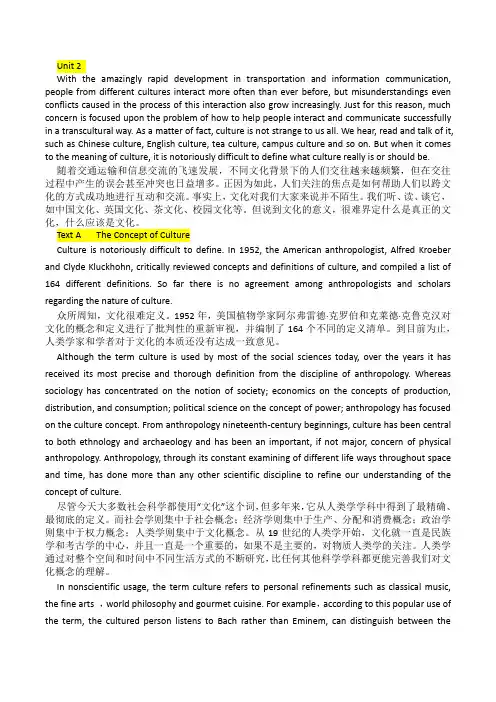
Unit 2With the amazingly rapid development in transportation and information communication, people from different cultures interact more often than ever before, but misunderstandings even conflicts caused in the process of this interaction also grow increasingly. Just for this reason, much concern is focused upon the problem of how to help people interact and communicate successfully in a transcultural way. As a matter of fact, culture is not strange to us all. We hear, read and talk of it, such as Chinese culture, English culture, tea culture, campus culture and so on. But when it comes to the meaning of culture, it is notoriously difficult to define what culture really is or should be.随着交通运输和信息交流的飞速发展,不同文化背景下的人们交往越来越频繁,但在交往过程中产生的误会甚至冲突也日益增多。
正因为如此,人们关注的焦点是如何帮助人们以跨文化的方式成功地进行互动和交流。
事实上,文化对我们大家来说并不陌生。
我们听、读、谈它,如中国文化、英国文化、茶文化、校园文化等。
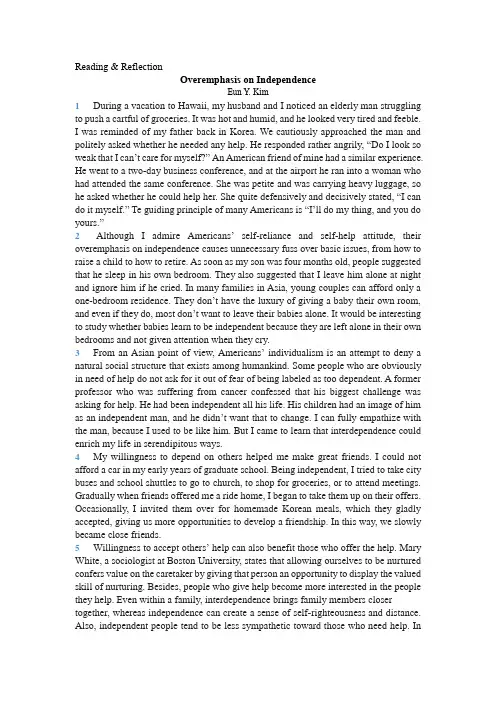
Reading & ReflectionOveremphasis on IndependenceEun Y. Kim1 During a vacation to Hawaii, my husband and I noticed an elderly man struggling to push a cartful of groceries. It was hot and humid, and he looked very tired and feeble.I was reminded of my father back in Korea.We cautiously approached the man and politely asked whether he needed any help. He responded rather angrily, “Do I look so weak that I can’t care for myself?” An American friend of mine had a similar experience. He went to a two-day business conference, and at the airport he ran into a woman who had attended the same conference. She was petite and was carrying heavy luggage, so he asked whether he could help her. She quite defensively and decisively stated, “I can do it myself.” Te guiding principle of many Americans is “I’ll do my thing, and you do yours.”2 Although I admire Americans’self-reliance and self-help attitude,their overemphasis on independence causes unnecessary fuss over basic issues, from how to raise a child to how to retire. As soon as my son was four months old, people suggested that he sleep in his own bedroom. They also suggested that I leave him alone at night and ignore him if he cried.In many families in Asia, young couples can afford only a one-bedroom residence. They don’t have the luxury of giving a baby their own room, and even if they do, most don’t want to leave their babies alone. It would be interesting to study whether babies learn to be independent because they are left alone in their own bedrooms and not given attention when they cry.3 From an Asian point of view, Americans’ individualism is an attempt to deny a natural social structure that exists among humankind. Some people who are obviously in need of help do not ask for it out of fear of being labeled as too dependent. A former professor who was suffering from cancer confessed that his biggest challenge was asking for help. He had been independent all his life. His children had an image of him as an independent man, and he didn’t want that to change. I can fully empathize with the man, because I used to be like him. But I came to learn that interdependence could enrich my life in serendipitous ways.4 My willingness to depend on others helped me make great friends.I could not afford a car in my early years of graduate school. Being independent, I tried to take city buses and school shuttles to go to church,to shop for groceries, or to attend meetings. Gradually when friends offered me a ride home, I began to take them up on their offers. Occasionally,I invited them over for homemade Korean meals, which they gladly accepted, giving us more opportunities to develop a friendship. In this way,we slowly became close friends.5 Willingness to accept others’ help can also benefit those who offer the help. Mary White, a sociologist at Boston University, states that allowing ourselves to be nurtured confers value on the caretaker by giving that person an opportunity to display the valued skill of nurturing. Besides,people who give help become more interested in the people they help.Even within a family, interdependence brings family members closer together, whereas independence can create a sense of self-righteousness and distance. Also, independent people tend to be less sympathetic toward those who need help. InAfrica, there is a saying that men become men through other men.6 In international business, letting go of pride and asking for help can improve negotiations. One of the mistakes Americans make in negotiating with Asians is that they often present themselves as proud and strong who can do anything. They act as if they can survive and conquer alone. But if they were willing to let go of some of their independence, they could develop allies instead of enemies. An American lawyer who lived and worked in Japan said that when he shared his worry about specific contract terms and conditions with the Japanese, many of them were more than willing to help him. Another American businessman talked about reaching a deadlock in a negotiation session with some Korean partners. When the two sides took a break, he said to one of his Korean partners, “You hold my destiny in your hand.” And he meant it. After the break, the Korean negotiators were much more gentle and agreeable, and he learnt that sharing his feelings was his best negotiation strategy.7 Admitting that we need help does not mean admitting weakness.Rather it displays the strength to acknowledge that we need the resources around us. As an Asian saying goes, “If you share your happiness, it will be doubled. If you share your unhappiness, it will be halved.”参考译文过分强调独立金恩英在夏威夷度假期间,我和我丈夫注意到一位年长的男士正费力地推着满满的一车货物。
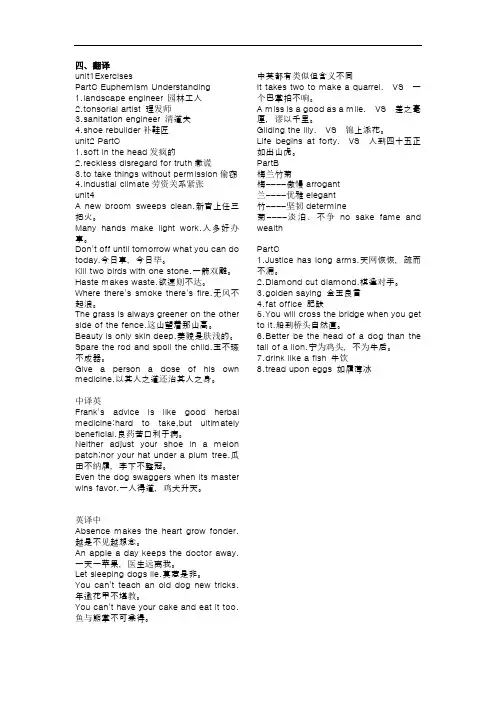
四、翻译unit1ExercisesPartC Euphemism Understandingndscape engineer 园林工人2.tonsorial artist 理发师3.sanitation engineer 清道夫4.shoe rebuilder补鞋匠unit2 PartC1.soft in the head发疯的2.reckless disregard for truth撒谎3.to take things without permission偷窃4.industial climate劳资关系紧张unit4A new broom sweeps clean.新官上任三把火。
Many hands make light work.人多好办事。
Don't off until tomorrow what you can do today.今日事,今日毕。
Kill two birds with one stone.一箭双雕。
Haste makes waste.欲速则不达。
Where there's smoke there's fire.无风不起浪。
The grass is always greener on the other side of the fence.这山望着那山高。
Beauty is only skin deep.美貌是肤浅的。
Spare the rod and spoil the child.玉不琢不成器。
Give a person a dose of his own medicine.以其人之道还治其人之身。
中译英Frank's advice is like good herbal medicine:hard to take,but ultimately beneficial.良药苦口利于病。
Neither adjust your shoe in a melon patch;nor your hat under a plum tree.瓜田不纳履,李下不整冠。
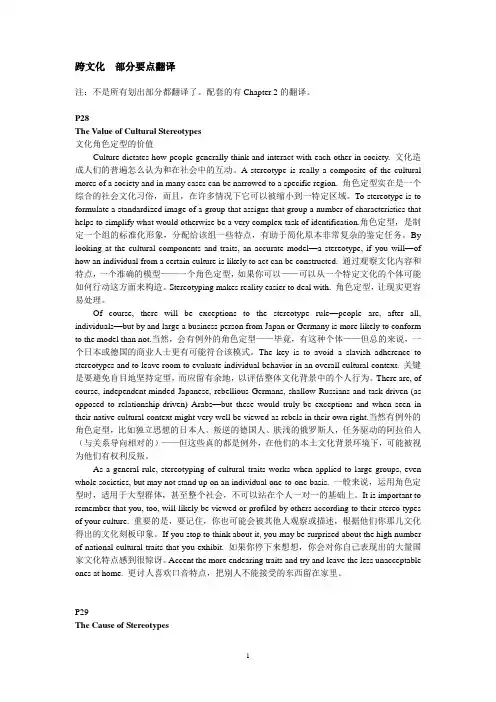
跨文化部分要点翻译注:不是所有划出部分都翻译了。
配套的有Chapter 2的翻译。
P28The Value of Cultural Stereotypes文化角色定型的价值Culture dictates how people generally think and interact with each other in society.文化造成人们的普遍怎么认为和在社会中的互动。
A stereotype is really a composite of the cultural mores of a society and in many cases can be narrowed to a specific region.角色定型实在是一个综合的社会文化习俗,而且,在许多情况下它可以被缩小到一特定区域。
To stereotype is to formulate a standardized image of a group that assigns that group a number of characteristics that helps to simplify what would otherwise be a very complex task of identification.角色定型,是制定一个组的标准化形象,分配给该组一些特点,有助于简化原本非常复杂的鉴定任务。
By looking at the cultural components and traits, an accurate model—a stereotype, if you will—of how an individual from a certain culture is likely to act can be constructed.通过观察文化内容和特点,一个准确的模型——一个角色定型,如果你可以——可以从一个特定文化的个体可能如何行动这方面来构造。
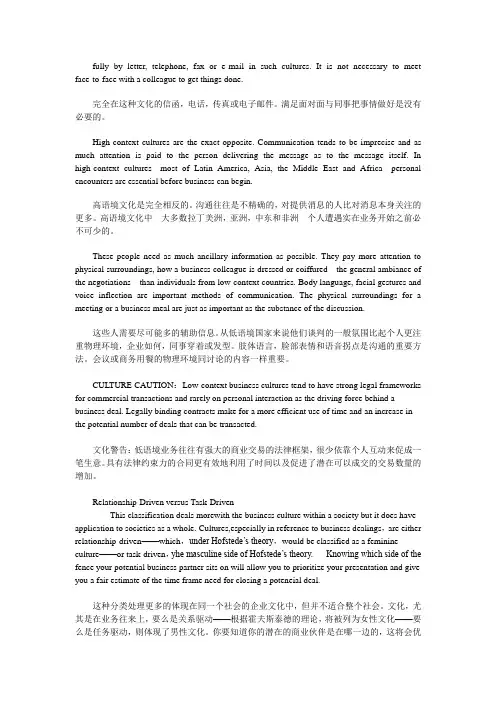
fully by letter, telephone, fax or e-mail in such cultures. It is not necessary to meet face-to-face with a colleague to get things done.完全在这种文化的信函,电话,传真或电子邮件。
满足面对面与同事把事情做好是没有必要的。
High-context cultures are the exact opposite. Communication tends to be imprecise and as much attention is paid to the person delivering the message as to the message itself. In high-context cultures---most of Latin America, Asia, the Middle East and Africa---personal encounters are essential before business can begin.高语境文化是完全相反的。
沟通往往是不精确的,对提供消息的人比对消息本身关注的更多。
高语境文化中---大多数拉丁美洲,亚洲,中东和非洲---个人遭遇实在业务开始之前必不可少的。
These people need as much ancillary information as possible. They pay more attention to physical surroundings, how a business colleague is dressed or coiffured---the general ambiance of the negotiations---than individuals from low-context countries. Body language, facial gestures and voice inflection are important methods of communication. The physical surroundings for a meeting or a business meal are just as important as the substance of the discussion.这些人需要尽可能多的辅助信息。
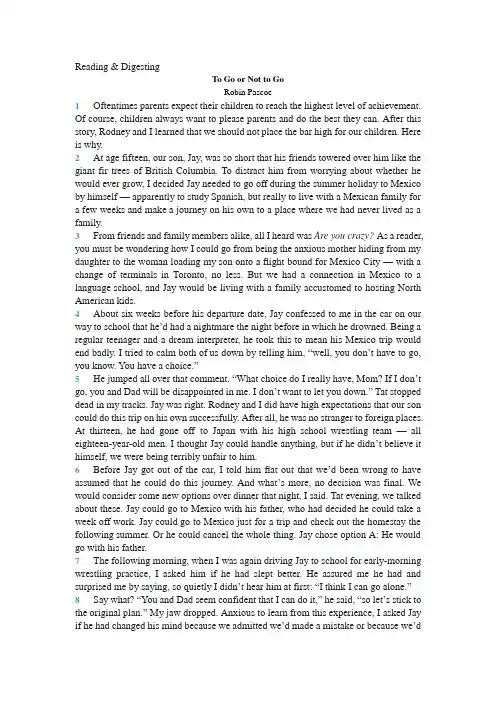
Reading & DigestingTo Go or Not to GoRobin Pascoe1 Oftentimes parents expect their children to reach the highest level of achievement. Of course, children always want to please parents and do the best they can. After this story, Rodney and I learned that we should not place the bar high for our children. Here is why.2 At age fifteen, our son, Jay, was so short that his friends towered over him like the giant fir trees of British Columbia. To distract him from worrying about whether he would ever grow, I decided Jay needed to go off during the summer holiday to Mexico by himself — apparently to study Spanish, but really to live with a Mexican family for a few weeks and make a journey on his own to a place where we had never lived as a family.3 From friends and family members alike, all I heard was Are you crazy? As a reader, you must be wondering how I could go from being the anxious mother hiding from my daughter to the woman loading my son onto a flight bound for Mexico City — with a change of terminals in Toronto, no less. But we had a connection in Mexico to a language school, and Jay would be living with a family accustomed to hosting North American kids.4 About six weeks before his departure date, Jay confessed to me in the car on our way to school that he’d had a nightmare the night before in which he drowned. Being a regular teenager and a dream interpreter, he took this to mean his Mexico trip would end badly. I tried to calm both of us down by telling him, “well, you don’t have to go, you know. You have a choice.”5 He jumped all over that comment. “What choice do I really have,Mom? If I don’t go, you and Dad will be disappointed in me. I don’t want to let you down.” Tat stopped dead in my tracks. Jay was right. Rodney and I did have high expectations that our son could do this trip on his own successfully. After all, he was no stranger to foreign places. At thirteen, he had gone off to Japan with his high school wrestling team —all eighteen-year-old men. I thought Jay could handle anything, but if he didn’t believe it himself, we were being terribly unfair to him.6 Before Jay got out of the car, I told him flat out that we’d been wrong to have assumed that he could do this journey. And what’s more, no decision was final. We would consider some new options over dinner that night, I said. Tat evening, we talked about these. Jay could go to Mexico with his father, who had decided he could take a week off work. Jay could go to Mexico just for a trip and check out the homestay the following summer. Or he could cancel the whole thing. Jay chose option A: He would go with his father.7 The following morning, when I was again driving Jay to school for early-morning wrestling practice, I asked him if he had slept better. He assured me he had and surprised me by saying, so quietly I didn’t hear him at first: “I think I can go alone.”8 Say what? “You and Dad seem confident that I can do it,” he said, “so let’s stick to the original plan.” My jaw dropped. Anxious to learn from this experience, I asked Jay if he had changed his mind because we admitted we’d made a mistake or because we’doffered him real choices. He answered yes to both points.9 So that summer, Jay went off to Mexico. Rodney and I learned not only that constructive consultation is important, but that we needed to temper our expectations. Jay never complained again about being short.But it should go without saying that I didn’t sleep very well the entire time he was gone.参考译文去还是不去?罗宾·帕斯科埃通常父母都希望孩子们能够做到最好,当然孩子也总想取悦父母,所以也会尽自己所能。
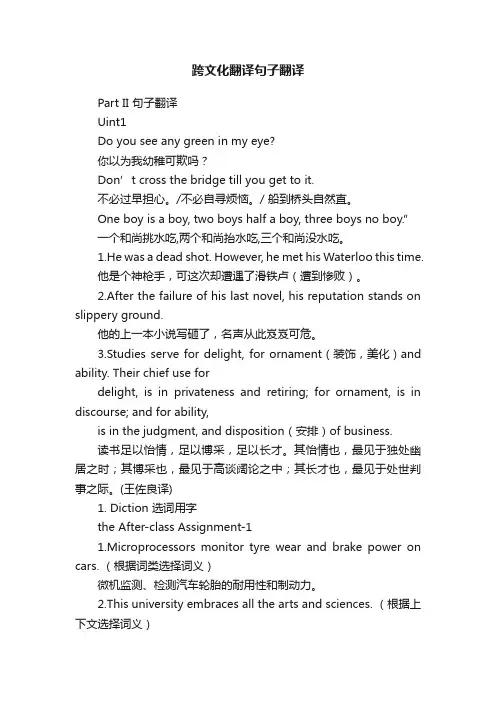
跨文化翻译句子翻译Part II 句子翻译Uint1Do you see any green in my eye?你以为我幼稚可欺吗?Don’t cross the bridge till you get to it.不必过早担心。
/不必自寻烦恼。
/ 船到桥头自然直。
One boy is a boy, two boys half a boy, three boys no boy.”一个和尚挑水吃,两个和尚抬水吃,三个和尚没水吃。
1.He was a dead shot. However, he met his Waterloo this time.他是个神枪手,可这次却遭遇了滑铁卢(遭到惨败)。
2.After the failure of his last novel, his reputation stands on slippery ground.他的上一本小说写砸了,名声从此岌岌可危。
3.Studies serve for delight, for ornament(装饰,美化)and ability. Their chief use fordelight, is in privateness and retiring; for ornament, is in discourse; and for ability,is in the judgment, and disposition(安排)of business.读书足以怡情,足以博采,足以长才。
其怡情也,最见于独处幽居之时;其博采也,最见于高谈阔论之中;其长才也,最见于处世判事之际。
(王佐良译)1. Diction 选词用字the After-class Assignment-11.Microprocessors monitor tyre wear and brake power on cars. (根据词类选择词义)微机监测、检测汽车轮胎的耐用性和制动力。
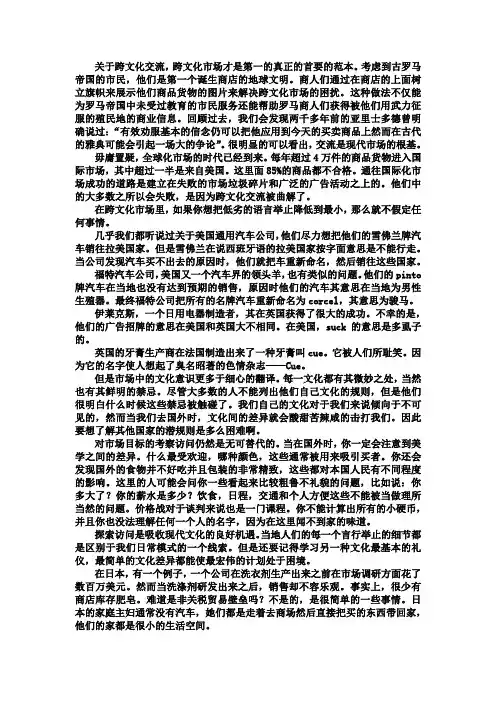
关于跨文化交流,跨文化市场才是第一的真正的首要的范本。
考虑到古罗马帝国的市民,他们是第一个诞生商店的地球文明。
商人们通过在商店的上面树立旗帜来展示他们商品货物的图片来解决跨文化市场的困扰。
这种做法不仅能为罗马帝国中未受过教育的市民服务还能帮助罗马商人们获得被他们用武力征服的殖民地的商业信息。
回顾过去,我们会发现两千多年前的亚里士多德曾明确说过:“有效劝服基本的信念仍可以把他应用到今天的买卖商品上然而在古代的雅典可能会引起一场大的争论”。
很明显的可以看出,交流是现代市场的根基。
毋庸置疑,全球化市场的时代已经到来。
每年超过4万件的商品货物进入国际市场,其中超过一半是来自美国。
这里面85%的商品都不合格。
通往国际化市场成功的道路是建立在失败的市场垃圾碎片和广泛的广告活动之上的。
他们中的大多数之所以会失败,是因为跨文化交流被曲解了。
在跨文化市场里,如果你想把低劣的语言举止降低到最小,那么就不假定任何事情。
几乎我们都听说过关于美国通用汽车公司,他们尽力想把他们的雪佛兰牌汽车销往拉美国家。
但是雪佛兰在说西班牙语的拉美国家按字面意思是不能行走。
当公司发现汽车买不出去的原因时,他们就把车重新命名,然后销往这些国家。
福特汽车公司,美国又一个汽车界的领头羊,也有类似的问题。
他们的pinto 牌汽车在当地也没有达到预期的销售,原因时他们的汽车其意思在当地为男性生殖器。
最终福特公司把所有的名牌汽车重新命名为corcel,其意思为骏马。
伊莱克斯,一个日用电器制造者,其在英国获得了很大的成功。
不幸的是,他们的广告招牌的意思在美国和英国大不相同。
在美国,suck的意思是多虱子的。
英国的牙膏生产商在法国制造出来了一种牙膏叫cue。
它被人们所耻笑。
因为它的名字使人想起了臭名昭著的色情杂志——Cue。
但是市场中的文化意识更多于细心的翻译。
每一文化都有其微妙之处,当然也有其鲜明的禁忌。
尽管大多数的人不能列出他们自己文化的规则,但是他们很明白什么时候这些禁忌被触碰了。
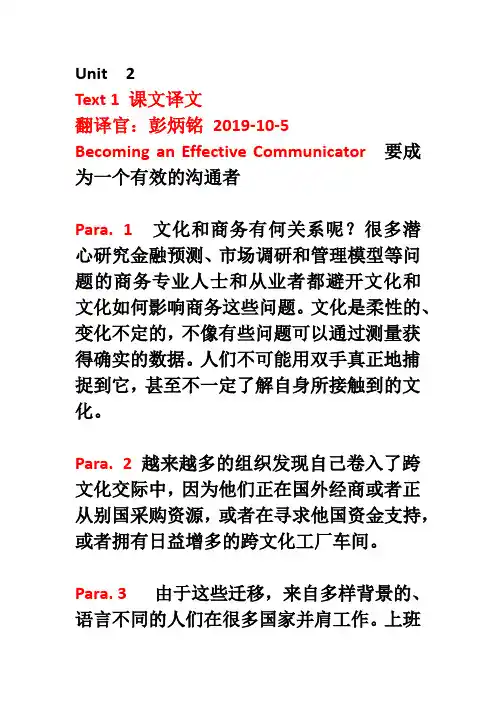
Unit 2Text 1 课文译文翻译官:彭炳铭2019-10-5Becoming an Effective Communicator 要成为一个有效的沟通者Para. 1 文化和商务有何关系呢?很多潜心研究金融预测、市场调研和管理模型等问题的商务专业人士和从业者都避开文化和文化如何影响商务这些问题。
文化是柔性的、变化不定的,不像有些问题可以通过测量获得确实的数据。
人们不可能用双手真正地捕捉到它,甚至不一定了解自身所接触到的文化。
Para. 2 越来越多的组织发现自己卷入了跨文化交际中,因为他们正在国外经商或者正从别国采购资源,或者在寻求他国资金支持,或者拥有日益增多的跨文化工厂车间。
Para. 3由于这些迁移,来自多样背景的、语言不同的人们在很多国家并肩工作。
上班时的跨文化沟通不再是遥远未来的目标,而是眼下此时此刻必需的事情。
Para. 4 跨文化沟通能力被广泛地认为是一个人在既定环境里其行为是否恰当和有效的一种印象。
通常工作能力被认为是一种熟练的行为能力。
Para. 5 恰当(appropriateness)就意味着不能违反那些关系中重要的规则、行为规范和期望。
效能(effectiveness)是指相对于成本和替代物而言的重要目标的实现或报酬的获得。
有了这两个标准,在跨文化环境中的沟通才是令人满意的。
只有那些既恰当又有效的国际商人才能达到跨文化最佳商务沟通者的标准要求。
下面例子将说明恰当与效能的区别。
布赖恩.霍尔兹(Brian Holtz)是一个美国商人,被公司派到泰国做公司的办公室主任。
塔里先生(Thani)是公司泰国曼谷分部的重要的副经理,最近上班总是迟到。
霍尔兹不得不决定如何处理这一问题。
经过深思熟虑,他有四种策略:(1)私下找塔里问缘由并告诉他上班要准时;(2)忽略这个问题不管;(3)下次再迟到就公开训斥他;(4)私下讨论时,建议说自己在帮他找一个助理来处理其部下上班迟到的问题,并征求他的意见:如何处理。
Unit 2 Page 60 Unit 3 Page 96Unit 5 Page 175 Unit 6 Page 215Case 2A common cultural misunderstanding in classes involves conflicts between what is said to be direct communication style and indirect communication style. In American culture, people tend to say what is on their minds and to mean what they say. Therefore, students in class are expected to ask questions when they need clarification. Mexican culture shares this preference of style with American culture in some situations, and that‘s why the students from Mexico readily adopted the techniques of asking questions in class. However, Korean people generally prefer indirect communication style, and therefore they tend to not say what is on their minds and to rely more on implications and inference, so as to be polite and respectful and avoid losing face through any improper verbal behavior. As is mentioned in the case, to many Koreans, numerous questions would show a disrespect for the teacher, and would also reflect that the student has not studied hard enough.Case 3The conflict here is a difference in cultural values and beliefs. In the beginning, Mary didn’t realize that her Dominican sister saw her as a member of the family, literally. In the Dominican view, family possessions are shared by everyone of the family. Luz was acting as most Dominican sisters would do in borrowing without asking every time. Once Mary understood that there was a different way of looking at this, she would become more accepting. However, she might still experience the same frustration when this happened again. She had to find ways to cope with her own emotional cultural reaction as well as her practical problem (the batteries running out).Case 6When a speaker says something to a hearer, there are at least three kinds ofmeanings involved: utterance meaning, speaker’s meaning and hearer’s meaning. In the dialogue, when Litz said ‘How long is she going to stay?’ she meant to say that if she knew how long her mother-in-law was going to stay in Finland, she would be able to make proper arrangements for her, such as taking her out to do some sightseeing. However, her mother-in-law overheard the conversation, and took Litz’s question to mean “Litz does not want me to stay for long”. From the Chinese point of view, it seems to be inappropriate for Litz to ask such a question just two days after her mother-in-law’s arrival. If she feels she has to ask the question, it would be better to ask some time later and she should not let her mother-in-law hear it.Case 7Keiko insists on giving valuable gifts to her college friends, because in countries like Japan, exchanging gifts is a strongly rooted social tradition. Should you receive a gift, and don’t have one to offer in return, you will probably create a crisis. If not as serious as a crisis, one who doesn’t offer a gift in return may be considered rude or impolite. Therefore, in Japan, gifts are a symbolic way to show appreciation, respect, gratitude and further relationship.Keiko obviously has taken those used items from Mary, Ed and Marion as gifts, for she probably doesn’t know that Americans frequently donate their used household items to church or to the community. Mary, Ed and Marion would never consider those used household items given to Keiko as gifts. No wonder they felt very uncomfortable when they received valuable gifts in return.Case 10In Japan, a company is often very much like a big family, in which the manger(s) will take good care of the employees and the employees are expected to devote themselves to the development of the company and, if it is necessary, to sacrifice their own individual interests for the interests of the company, from which, in the long run, the employees will benefit greatly. But for the French, a company is just a loosely- knit social organization wherein individuals are supposed to take care of themselves and their families. Moreover, the way the French make decisions in the family might also be different from the typical Japanese one, which may not often involve females and the power to decide usually lies with the dominating male. As there are such cultural differences between the Japanese and the French, Mr. Legrand’s decision made Mr. Tanaka feel dumbfounded.Case 12In this case, it seems that the Chinese expectations were not fulfilled. First, having two people sharing host responsibilities could be somewhat confusing to the hierarchically minded Chinese. Second, because age is often viewed as an indication of seniority, the Chinese might have considered the youth of their Canadian hosts as slight to their own status. Third, in China, it is traditional for the host to offer a welcome toast at the beginning of the meal, which is the reciprocated by the guests; by not doing so, the Canadian might be thought rude. The abrupt departure of the Chinese following the banquet was probably an indication that they were not pleased with the way they were treated. The Canadians’ lack of understanding of the Chinese culture and the Chinese ways of communication clearly cost them in their business dealings with the visiting delegation.Case 17When these two men separate, they may leave each other with very different impressions.Mr Richardson is very pleased to have made the acquaintance of Mr Chu and feels they have gotten off to a very good start. They have established their relationship on a first-name basis and Mr Chu’s smile seemed to indicate that he will be friendly and easy to do business with. Mr Richardson is particularly pleased that he had treated Mr Chu with respect for his Chinese background by calling him Hon-fai rather than using the western name, David, which seemed to him an unnecessary imposition of western culture.In contrast, Mr Chu feels quite uncomfortable with Mr Richardson. He feels it will be difficult to work with him, and that Mr Richardson might be rather insensitive to cultural differences. He is particularly bothered that, instead of calling him David or Mr Chu, Mr Richardson used his given name, Hon-fai, the name rarely used by anyone, in fact. It was this embarrassment which caused him to smile. He would feel more comfortable if they called each other Mr Chu and Mr Richardson. Nevertheless, when he was away at school in North America he learned that Americans feel uncomfortable calling people Mr for any extended period of time. His solution was to adopt a western name. He chose David for use in such situations.Case 19Talking about what’s wrong is not easy for people in any culture, but people in high-context countries like China put high priority on keeping harmony, preventing anyone from losing face, and nurturing the relationship. It seems that Ron Kelly had to learn a different way of sending message when he was in China. At home in Canada he would have gone directly to the point. But in China, going directly to the problem with someone may suggest that he or she has failed to live up to his or her responsibility and the honor of his or her organization is in question. In high-context cultures like China, such a message is serious and damaging. In low-context cultures, however, the tendency is just to “spit it out”, to get it into words and worry about the result later. Senders of unwelcome messages use objective facts, assuming, as with persuasion, that facts are neutral, instrumental, and impersonal. Indirectness is often the way members of high-context cultures choose to communicate about a problem. Case 21Sometimes our best intentions can lead to breakdowns (故障)in cross-cultural communication. For example, one of the very common manners of touching --- handshaking --- may result in conflict when performed with no consideration of cultural differences. Among middle-class North American men, it is customary to shake hands as a gesture of friendship. When wanting to communicate extra friendliness, a male in the United States may, while shaking hands, grasp with his left hand his friend’s right arm. However, to people of Middle Eastern countries, the left hand is profane (亵渎的) and touching someone with it is highly offensive. Therefore, in Vernon’s eyes, Kenneth was actually an extremely offensive message to him. Case 22In Puerto Rican culture, as in some other Latin American and Eastern cultures, it is not right for a child to keep an eye-contact with an adult who is accusing him or her, while in the United States, failing of meeting other person’s eye accusing him or her would be taken as a sign of guiltiness. As the principal knew little about this cultural difference in using eye-contact, he decided that the girl must be guilty. Generallyspeaking, avoiding eye-contact with the other(s) is often considered as an insult in some cultures, but may signify respect for authority and obedience in other cultures. Case 25For people from the American culture and western European cultures, one’s time should be scheduled into segments or compartments which are to be kept discrete from one another. They prefer to do one thing at a time. They will be annoyed when they have made an appointment with somebody, only to find a lot of other things going on at the same time. They don’t like to interrupt others and be interrupted by other while they are doing something. In contrast, people from many other cultures including the Chinese culture are more likely to operate with several people, ideas, or matters simultaneously. They are more easily distracted and subject to interruptions, which they would not usually mind very much. The miscommunication between Katherine and the director can be ascribed to their lack of knowledge about each other’s way of using time.In this case, to the Chinese director as well as many other Chinese people, it is natural to handle the other things which needed to be dealt with immediately. He may have thought that, in this way, he utilized the time best. But to Katherine and most Westerners, it’s quite different. They tend to do things strictly according to their schedule and appointments with others, which is their concept of using time best.高语境交流和低语境交流(由高到低排列)Japanese, Chinese, Korean, African American, Native American, Arab, Greek, Latin,Italian,English,Frech,Amercian,Scandinavian,German,German-Swiss。
跨文化交际英语阅读教程4课文翻译第一课:文化差异与交际文化差异的定义文化差异是指不同国家或地区之间的历史、地理、宗教、经济等方面的差异。
这些差异会影响到人们的价值观、信仰、行为习惯、社会组织形式等。
在跨文化交际中,了解和尊重文化差异非常重要。
文化差异对交际的影响文化差异对交际有着深远的影响。
不同文化背景的人在沟通交流中可能会遇到以下问题: 1. 语言障碍:不同国家和地区使用不同的语言,理解和表达存在障碍。
2. 非语言符号的差异:不同国家和地区的非语言符号(如手势、表情、礼仪等)可能有不同的含义,容易引发误解。
3. 礼貌和礼仪的差异:不同文化对礼貌和礼仪的要求有所不同,可能会造成交际上的尴尬和冲突。
4. 价值观的冲突:不同文化对价值观的理解和认同也存在差异,可能会引发理念上的冲突。
跨文化交际的技巧为了更好地进行跨文化交流,以下是一些技巧: 1. 学习对方的语言:学习对方的语言可以加深理解,减少语言障碍。
2. 了解对方的文化:了解对方的文化背景、价值观念和行为习惯,增进理解和尊重。
3. 尊重对方的非语言符号:避免使用可能被对方误解的非语言符号,尊重对方的习俗和文化。
4. 灵活调整自己的礼貌和礼仪:在不同文化背景下,灵活调整自己的礼貌和礼仪,以尊重对方的文化。
5. 接纳不同的价值观:不同文化的人们对于相同事物的看法可能存在差异,要学会接纳并理解对方的价值观。
第二课:文化沟通中的误解和解决高、低沟通语境的差异高沟通语境的文化中,人们通过非语言符号、隐含的信息和环境背景来传递信息;低沟通语境的文化中,人们更加注重直接明确的信息。
了解和适应不同的沟通语境是避免误解的关键。
文化差异引发的误解1.时间观念:在一些高度重视时间效率的文化中,迟到被视为不尊重;而在某些文化中,迟到是普遍存在的现象。
2.礼貌和直接表达:一些文化注重礼节和婉转的表达方式,而另一些文化更加注重直接坦率的交流。
3.非语言符号:不同文化的手势、表情、身体接触等非语言符号可能有不同的含义,可能会引发误解。
Unit Two Task 11)A smooth sea never made a skillful mariner. 平静的大海决不能造就出熟练的水手。
/花盆里生长不出参天大树。
/温室里长不出栋梁之才。
2)He who would search for pearls must dive below.不入虎穴,焉得虎子。
/ 欲寻珍珠就要潜到水里。
/ 欲寻珍珠欲潜入水。
3)Living without an aim is like sailing without a compass. 生活没有目标如同航行没有罗盘。
/没有目标的生活如同没有罗盘的航行。
4)To have another fish to fry另有要事/ 另有事情得做5)The water that bears the boat is the same that swallows it up.水能载舟,亦能覆舟。
(The same knife cuts bread and fingers.)6)前人栽树,后人乘凉。
One sows and another reaps. / One man sows and another reaps. / One generation plants the trees in whose shade another generation rests. / The precedence planted, the later generations enjoy its cool.7)斩草不除根,逢春又发青。
If the grass is only cut, then the next spring it will revive. / Cut weeds and dig up the roots.8)种田不用问,深耕多上粪。
Planting has no better measures but ploughing deeply and fertilizing much more.9)生米煮成熟饭。
Checking Is Believing参考译文:验证为实网络随时在拓展,它几乎可以给大多数学科提供无限量的信息。
除了提供大量信息之外,网络使用起来也方便快捷。
如今,我们拥有很多设备它们可以联网并展示信息,即使当你在赶路时也是如此。
因此,网络可以提供一个获取信息的方便途径,而且网络已经受到了学生们的极力推崇。
如果一位学生有条件上网,那么他/她就没有必要去图书馆查找资料。
这样不仅节省了大量的时间也省去了交通费。
几乎可以这样说,学生们比上班族有更多的时间浏览网页,网络上提供的信息有助于他们完成学习任务,这一点成了他们上网的额外动机。
Reading BThis freedom is, of course, in sharp contrast to traditional media. Publishing companies, for example, can be very selective about their authors. Such companies have high standards and will only publish a book if the author is well qualified and experienced in the subject area. Publishers get other experts to review a book before it is printed and further improvements to the book are made by editors and book designers employed by the publishing companies. Editors frequently make suggestions to make the book longer or shorter and to improvethe au thor’s use of language to make the writing clearer and more easily comprehensible to readers. Designers handle the layout of a book, including the cover, photographs and other graphics and even the font type and style of the text.参考译文:网络提供的这种自由和传统的媒介相比当然有着明显的区别。
Speaki ng Englis h with a Japane se mind 日本人在达到上学年龄后就要学英语,这些人在学会英语之后就可能用英语进行对外交流,但是他们所使用的英语要受到他们本民族的语言和文化的影响。
因此这就会造成困扰和误解在与其他用英语的人交流时。
AM,当他作为索尼公司的首席执行官时,在一次给美国的商学会做报告时他指出了这两种语言的明显差异。
他举了一个例子,一个美国商人向他的一个日本生意上的伙伴提议了一项计划。
可是当美国人完成时,日本人才开始谈论这个项目听起来多么有趣并且他们公司也有同样的想法。
美国人认为这个项目肯定会被接受。
但是随着辩论的拖延,美国人的关注也开始减弱,然后日本人说,不管怎样。
AM告诫说,接下来就是你要仔细听的时候了。
因为真正的回答是在那个词语的后面。
他经常告诫他的部下官员要用一种大多数的使用英语的人都习惯的方式说话,如果他想被别人理解。
他还告诫说,在日本你可能是大多数,但是到了国外你就是一小部分。
要想用一种大多数人都能最大限度的理解你的方式说话需要更多的语法知识和大量的词汇。
你必须对你所谈话的那个人的交流方式,社交礼仪,价值观等等很熟悉。
日本人的说话顺序正好和说英语的人相反。
甚至就是一个非常简单的句子,比如英国人会说,你得带伞因为要下雨。
而日本人会说,因为会下雨所以你要带伞。
不管这种正常的表达方式的顺序是否会控制想法顺序还是什么,日本人这种用不同顺序的表达信息的方式会让那些说英语的国家的人且对日本语言不了解的人感到困惑。
另一个例子就是,一些说英语的日本人和美国的一些领导举行卫星电视会议来讨论两国间的经济和贸易关系。
日本的参会者说着流利的英语,同时会被翻译成日语以供那些不懂得英语的人理解。
Translation1The growth of intercultural communication as a field of study is based on a view of history that clearly demonstrates people and cultures have been troubled by a persistent inability to understand and get along with groups and societies removed by space, ideology, appearance, and behavior from their own. What is intriguing about many of human civilization’s failure is that they appear to be personal as well as global. The story of humankind is punctuated with instances of face-to-face conflicts as well as international misunderstanding--major and minor quarrels that range from simple name-calling to isolationism tr even armed conflict. It is obvious that increases contact with other cultures and subcultures make it imperative for us to make a concerted effort to understand and get along with people whose beliefs and backgrounds may be vastly different from our own. The ability, through increased awareness and understanding, to peacefully coexist with people who do not necessarily share our lifestyles or values could benefit us not only in our own neighborhoods but could be the decisive factor in maintaining would peace. Translation 2Culture is something referred to as our mental programming, our “software of the mind.”But we can take that computer analogy further and say that culture is the operating environment that enables software programs to run. Culture is like DOS or Unix or Windows:it is what enables us to process information in various specific applications. The metaphor of windows seems to be very appealing to describe culture:culture is a mental set of windows through which all of life is viewed. It varies from individual to individual within a society, but it shares important characteristics with members of a society. Culture is like the water fish swim in--a reality that is taken for granted and rarely examined. It is in the air we breathe and is as necessary to our understanding of who we are as air is to our physical life. Culture is the property of a community people, not simply a characteristic of individuals. Societies are programmed by culture, and that programming comes from similar life experiences and similar interpretations of what those experiences mean. If culture is mental programming, it is also a mental map of reality. It tells us from early childhood what matters, what o prefer, what to avoid, and what to do. Culture also tells us what ought to be . It gives us assumptions about the ideal beyond what individuals may experience. It helps us in setting priorities. It establishes codes for behavior and provides justification and legitimization for that behavior.Translation 3Although each of us has a unique set of values, there also are values that tend to permeate a culture. These are called cultural values. Cultural values generally are normative in that they inform a member of a culture what is good and bad, right and false, positive and negative, and the like. Cultural values define what is worthwhile to die for, what is worth protecting, what frightens people and their social systems, what are considered proper subjects for study and for ridicule, and what types of events lead individuals to group solidarity. Cultural values also specify what behaviors are of importance and which should be avoided within a culture. Values represent a learned organization of rules for making choices and for resolving conflicts. The values held by participants in intercultural communication are important because values develop standards and guidelines that establish appropriate and inappropriate behaviors in a society. V alues, in other words, help determine how people ought to behave with the result that people will exhibit and expect behaviors according to their value systems. To the extent that cultural value systems differ, we may expect that intercultural communication participants will tend to exhibit and to expect different under similar circumstance.Translation 4When we say that language is always ambiguous, what we mean is that we can never fully control the meaning of the things we say and write. The meanings we exchange by speaking and by writing are not given in the words and sentences alone but are also constructed partly out of what our listeners and our readers interpret them to mean. To put this quite another way, meaning in language is jointly constructed by the participants in communication. Language is inherently ambiguous. It means that in order to communicate we must always jump to conclusions about what other mean. There is no way around this. When someone says something, w must jump to some conclusion about what he or she means. We draw inferences based on two main sources. 1, the language they have used, and 2, our knowledge about the world. The knowledge includes expectations about what people would normally say in such circumstances. Language is ambiguous. This means that we can never be certain what the other person means--whether in speaking or writing. To put it another way, language can never fully express our meanings. But what does this mean for intercultural communication? In the first place it should be clear that communication works better the more the participants share assumptions and knowledge about the world. Where two people have very similar histories, backgrounds, and experiences, their communication works fairly easily because the inferences each makes about what the other means will be based on common experience and knowledge. Two people from the same village and the same family are likely to make fewer mistakes in drawing inferences about what the other means than two people from different cities on different sides of the earth.Translation 5Where any two people differ in group membership because they are of different genders, different ages, different ethnic or culture groups, different educations, different parts of the same country or even city, different income or occupational groups, or with very different personal histories, each will find it more difficult to draw inferences about what the other person means.In the contemporary world of international and intercultural communication, the differences between people are considerable. People are in daily contact with members of cultures and other groups from all around the world. Successful communication is based on sharing as much as possible the assumptions we make about what others mean. When we are communicating with people who are very different from us, it is very difficult to know how ti draw inferences about what they mean, and so it is impossible to depend on shared knowledge and background for confidence in our interpretation.It has been found that men and women from the same culture, even from the sane families, often misunderstand each other because of different assumptions they make about the purposes or goals of their communication. A man may wish to make a woman happy by giving her a gift of something she really wants. He asks her what she would like to have for her birthday--- she can ask for anything. Unfortunately, what she wants more than anything else is for him to know intuitively what she would like to have. Men and women, at least in North American society, tend to differ in their concern for explicitness or for indirection. A woman is likely to think it is important for someone to show how well he knows her by not having to ask explicitly what she wants. A man in that situation, however, feels beast about the situation if he is told quiet directly and explicitly how he can make her happy.Translation 6Non-verbal communication might be thought of as any form of communication which is not directly dependent on the use of language. Generally speaking, however, it is very difficult to know where to separate verbal and non-verbal forms of communication. Such non-verbal aspects of communication as nodding the head most often accompany speech and are part and parcel of the verbal system of language use. On the other hand such forms of communication as dance and music often have no verbal component at all. What we want to here is simply to call attention to the fact that many aspects of human interaction depend upon forms of communication which can not be easily transcribed into words and yet are crucial to our understanding to each other.Of course we have to emphasize the importance of communication in speaking and writing, and yet we should also realize that much much communication also takes place without the use of words. The way a person dresses for a meeting may suggestion to other participants how he or she is prepared to participate in it. In fact, we can use virtually any aspect of our behavior or our presentation which others can perceive as means of communication.Translation 7Many people today want to do many things within so little time. The sense o time might be called time urgency, it is a syndrome of behavior in which the persons continually tries to accomplish more than can be humanly accomplished. Until very recently, time urgency was thought to be a characteristics of Americans, particularly American males in the generation born in the period from the Great Depression through to the end of the World War .It should be obvious that that this sense of time urgency is no longer a cultural characteristic of just this one generation of American males. It is a characteristic of the Asian “salary man”, and is spreading throughout the world rapidly as one aspect of the internationalization of business.One of the most important effects of this sense of time is that in communication it will almost produce a negative evaluation to the slower participants by the faster participants. Those who share in this concept of time urgency will come to see anyone who moves more slowly than they do as conservative, as uncooperative, as resistant to change, and as opposing progress. Behind the concept of time urgency is the idea that what lies ahead in the future is always better than what lies behind in the past; it based solidly on the belief in progress.Translation 8If we accept the belief that our past influences our view of reality and the corresponding tenet that each of us may have similar but not identical personal histories, then it should follow that another person’s picture of the universe will not be exactly like ours. Y et most of us act as if our way of perceiving things is the correct and only way. We often overwork perceptual differences and conclude that if the other person doesn’t see that Pablo Picasso is the greatest artist that ever lived, he simply does not art. Actually, it may well be that he has a different past history and what is great art for him may not match our perception of art.In our daily activities these differences in perception appear between different groups. V arious generations, minorities, occupation and cultures have conflicting values and goals that will influence their orientation and interpretation of reality.Our culture is a major of factor in perceptual discrepancies. Culture helps supply us with our perceptive of reality. It therefore plays a dominant role in intercultural communication. Our cultures tell us, in a variety of ways, how to judge others and what to use as criteria for those judgments. The danger of such evaluations is that they are often false, misleading, and arbitrary. It is truly a naive view of the world to believe and behave as if we an our culture have discovered the true and only set of norms.。